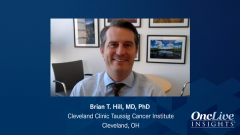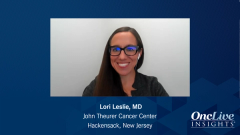
Typical Treatment Responses in Patients with FL and Incidence of Relapsed or Refractory Disease
Insights concerning typical treatment responses experienced by patients with FL, clinical factors that may be predictive of response, and the incidence of relapsed or refractory disease.
Episodes in this series

Dr. Brian T. Hill: So in our practice, we see that patients with advanced-stage follicular lymphoma including stage four typically do respond to treatment as measured by complete remission rate. If you use R-CHOP or BR therapy, we typically see responses and complete responses. In general, a negative PET scan at the end of treatment is more favorable than a partial remission which is typically associated with a shorter progression-free survival. However, the duration of the response is variable and probably related to a number of biologic features that we don't have a full appreciation of at the bedside. And what we see is for patients who have short remissions, certainly those under two years, after R-CHOP or bendamustine-Rituxan as frontline therapy, the overall survival of patients who relapse in that two year window is significantly limited compared to the survival of those who don't. So it's a little bit of a hindsight maneuver to say that the early relapse is associated with poor survival. But once you see it really relapse, we know that the likelihood of a treatment response to subsequent therapy is probably gonna decrease.
Clinical factors that may predict time to response, we discussed earlier the FLIPI score which does have age, stage, anemia, LDH as risk factors. There are some newly emerging molecular genetic testing that has been shown in various scenarios to be predictive of response, but these are not widely used in the, in clinical setting. So I would say in the current era in 2022, the high-risk disease really is defined after the fact as early relapse. Although we know a high FLIPI score is, pretend that we don't yet have a great way of approaching these patients that's different than we would for a low FLIPI score patient. How many patients will typically develop relapsed or refractory disease? Well it depends how long you look. But overall about 20% of patients will have these early two year progression events




































